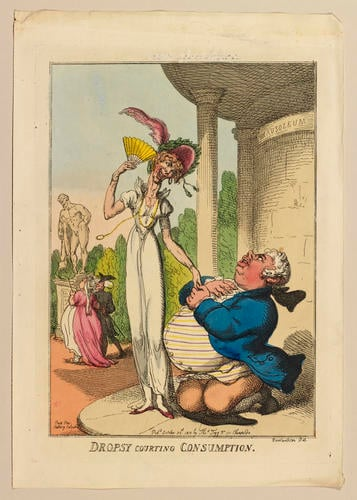On Tuesday died, of a dropsy, Miss Sarah Hinves, eldest daughter of Mr. Hinves, plumber, aged 26, after three years affliction, and a sixteenth operation, which she bore with much patience and calm resignation to the divine will.
Hampshire Chronicle 29 April 181
Poor Sarah died of one of the more dreaded of the Georgian diseases-dropsy, or, as the article says ‘a dropsy’, as it manifested itself in different ways. Dropsy is a form of acute water retention in the tissues. These days, it is much, much less of a problem; it is now called Oedema and the average first-world resident would only encounter dropsy in their pet fish. In the Georgian era, it was different. It could kill you and make your miserable before it did, and if it killed you, you would be a very unattractive corpse.
.Poor Sarah died of one of the more dreaded of the Georgian diseases-dropsy, or, as the article says ‘a dropsy’, as it manifested itself in different ways. Dropsy is a form of acute water retention in the tissues. These days, it is much, much less of a problem; it is now called Oedema and the average first-world resident would only encounter dropsy in their pet fish. In the Georgian era, it was different. It could kill you and make your miserable before it did, and if it killed you, you would be a very unattractive corpse.
In 1809 when Sarah Hinves first felt unwell, there would have been bloating in the stomach, arms or legs, chest, feet or bowels, or more than one. She would have regarded it as an affliction in itself, but ‘dropsy’ was a symptom of liver, kidney or cardiac disease. Malnutrition could also provoke it; we do not know how poor the Hinves were. Sarah may have suffered in many ways, depending on her dropsy or dropsies. Dropsy in limbs would make walking and working very difficult. A distended stomach was a common symptom, as was constipation (an aversion to motion, as the Georgians might say) as the retained water restricted the bowels. Appetite would be poor as the digestive system clogged up. Breathlessness was common, caused by compression of the lungs by the surrounding liquid. All internal organs would be under pressure. It was usually difficult to sleep because it was difficult to lie down-one victim managed no more than four hours a night over a period of a year
The first line of defence was purging and diuretics. The more urine you could pass, the more comfortable you would be. You would also need laxatives to compensate for the distended stomach blocking the digestion system. There were folk cures as well, some of them, like taking foxglove, actually worked, as they contained digitalis. Most, like grinding sixteen nutmegs and eating them, did not. Most of our descriptions come from the lurid advertisements of the Georgian quack doctors. This is an alarmist source, of course, but the need for credibility meant that the description of symptoms had to be credible.
The first line of defence was purging and diuretics. The more urine you could pass, the more comfortable you would be. You would also need laxatives to compensate for the distended stomach blocking the digestion system. There were folk cures as well, some of them, like taking foxglove, actually worked, as they contained digitalis. Most, like grinding sixteen nutmegs and eating them, did not. Most of our descriptions come from the lurid advertisements of the Georgian quack doctors. This is an alarmist source, of course, but the need for credibility meant that the description of symptoms had to be credible.
In 1799, Dr Bodrum’s, reported on a patient Mrs Jewel ( the wife of a linen draper, although the relevance of that is unclear) whose ankles swelled over her shoes as her legs ballooned. She could not breath. She was cured by a course of his Nervous Cordial ( large bottle one pound ten shillings) while others had despaired. Among the list of outlets where his medicine could be purchased was Jenner of Stroud – the same man who was about to revolutionise vaccination. In the next column of the newspaper, (Gloucester Journal 15 April 1799) the same Jenner is selling Whiteheads Essence of Mustard which conveniently cured a host of diseases, as ever in CAPITAL LETTERS – RHUEMATISMS, GOUT, LUMBAGO, PALSY. Most quack doctors claimed that the same medicine would cure lots of diseases; Dropsy was often linked with the Gravel- a painful expulsion of small stones in the kidney through the urinary system. This was the painful Georgian age.
No details were given; but Dr Bodrum’s nostrum would have been a diuretic. Another such medicine, this time in the disguise of an ancient remedy, was posited by the Newcastle Chronicle (1771). This suggested a sulphur and antimony paste twice a day and a limited of the amount of water per day (850 millilitres/ 1.5 pints) and no food with a high water content. Antimony was as poisonous as arsenic, but less likely to kill as it would induce vomiting and the violent evacuation of the bowels before it could kill you; clearly it would be a purgative of the most extreme form.
A slightly less dangerous cure from the Hampshire Chronicle was an eighteen day diet of living on broad beans and as little other liquid as possible; it may have been a cure for the terrible purging and poisoning that it replaced ; it also seems true that the broad bean is a diuretic. The popularity of pills and potions ( vapour baths, fumigations and frictions) was partly because the alternative was horrible. This was tapping.
Tapping involved removing liquid by inserting a drip in the abdomen or navel, puncturing the skin with a large curved needle and allow gravity to push out liquid from the tissues. This means that the patient would need to be standing up while this invasive work took place. The process was a mitigation, not a cure and would need to be repeated if the patient was not to drown in their own body fluid. We know Sarah endured this sixteen times.
Death was often caused by the tapping. In December 1798, an obituary suggested that Mrs Peach of Edgeware had been tapped eighty times; the Hampshire Chronicle ( October 1798) the Hampshire Chronicle recounted thrifty- three tapping for Mr Lad of Ipswich, noting that the liquid that came out was starchy and cloudy.
Dropsy was reasonably democratic. The Prince Regent had gout and dropsy in his final years, which were spent in Windsor in painfull misery. Charles James Fox died of it in 1806. When the obligatory reassurances were given to Fox about his recovery, the suffering politician knew the truth. Was there nothing that could be done about the accumulation of fluid in his body? ‘No was the reply: if the water is let out by one vent, it will only be to make room for more’
This was inspired by my latest research on Edward Law, Lord Ellenborough. His wife Anne had dropsy. Get the book and find out what happened to her!
My other books on this area of history;
All my books on British History





